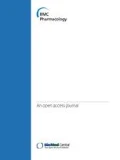We have studied the effects of inhibitors of the cGMP-metabolizing phosphodiesterases PDE2 and PDE9 on learning and memory.
Potent and selective inhibitors of phosphodiesterase 2 (PDE2) have long been elusive and most studies have used EHNA, a micromolar compound which also affects adenosine deaminase . Recently, we have developed and characterized BAY 60-7550, a nanomolar inhibitor of human PDE2A. Inhibition of PDE2 with BAY 60-7550 can increase neuronal cGMP levels in response to a stimulus of the NO/cGMP pathway in cell culture and slice models. On a functional level, BAY 60-7550 was shown to increase Long Term Potentiation (LTP), a physiological correlate of learning and memory. In vivo, oral administration of BAY 60-7550 improves memory consolidation in rodent models of learning and memory.
While PDE2 is a dual acting PDE, that can act on cGMP as well as on cAMP, PDE9 is a cGMP specific PDE. In contrast o PDE2, PDE9 has a much lower Km and thus higher affinity for its substrate. We have developed selective inhibitors of PDE9A and studied their effects on learning and memory. Similar to inhibitors of PDE2, these compounds increase cGMP levels in vitro, improve LTP and are active in several animal models of cognition. We therefore conclude that inhibition of both PDE2 and/or PDE9 is novel and effective paradigm to improve memory consolidation via the NO/cGMP pathway.
Author information
Authors and Affiliations
Corresponding author
Rights and permissions
Open Access This article is published under license to BioMed Central Ltd. This is an Open Access article is distributed under the terms of the Creative Commons Attribution License ( https://creativecommons.org/licenses/by/2.0 ), which permits unrestricted use, distribution, and reproduction in any medium, provided the original work is properly cited.
About this article
Cite this article
Hendrix, M. Selective inhibitors of cGMP phosphodiesterases as procognitive agents. BMC Pharmacol 5 (Suppl 1), S5 (2005). https://doi.org/10.1186/1471-2210-5-S1-S5
Published:
DOI: https://doi.org/10.1186/1471-2210-5-S1-S5

